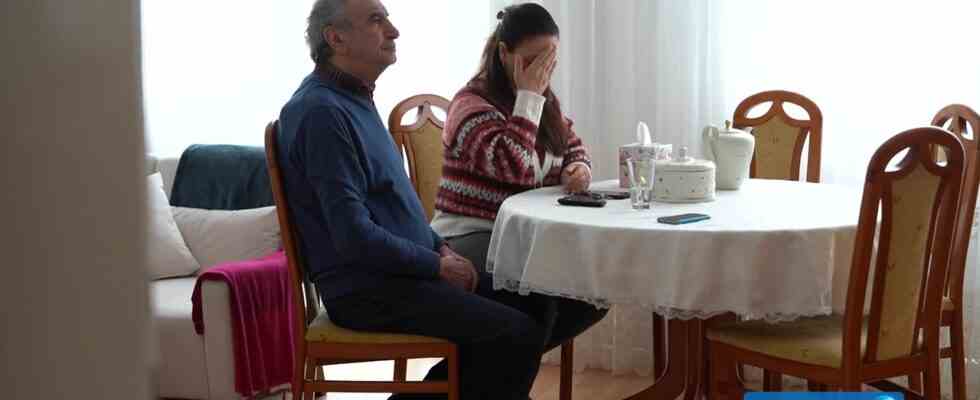report
Status: 07.02.2023 3:49 p.m
Thousands of kilometers from the earthquake area, relatives in Germany fear for their families in Turkey and Syria. Some are now certain. Others go to help.
Songul Taifur did it. Finally she has her brother on the phone. “Are you alright, sweetheart?” she asks him excitedly. Not only her mother, but also many relatives live in the south-east of Turkey. Some houses have collapsed, many damaged, 4,000 kilometers from Germany in the city of Diyarbakir.
“My mother is bedridden. She can’t walk even though she lives on the ground floor,” says Taifur. “My sister and niece help a lot and kept coming in to my mother to calm her down. She’s almost 95 years old. It’s bad.” She sits in her apartment in Duisburg with her husband Ali and feels powerless.
Songül Taifur is waiting in her apartment in Duisburg for signs of life from friends and relatives from Turkey.
Image: ARD still image
Constantly looking at the cell phone
She is constantly checking her cell phone, hoping that friends and relatives are doing well and that she is receiving positive news. “Some are still under rubble from my mother’s side in Diyarbakir. We hope that they will be rescued soon,” she says, fighting back tears. In the background are images from Turkish television from the region: blocks of flats that have collapsed like a house of cards. She and her husband have lived in Germany since 1969. They say they have never felt so helpless.
Aline Aynilian also knows the feeling of powerlessness. She tries as best she can to keep in touch with her family. On the night of the earthquake, the Syrian received a WhatsApp message from her brother: He and the rest of the family in Aleppo were alive. They spent the night in a church, she says, in constant fear of aftershocks. “I know from my mother that she trembles all the time,” says Aynilian. “She’s scared, of course she doesn’t want to go back home. You don’t know what else can happen.”
Turkish communities in Germany are organizing help for their old homeland
Philipp Wundersee, WDR, daily topics 9:35 p.m., February 6, 2023
“What can I do for you?”
Ayman Assaf lives in Leverkusen. The 37-year-old came to Germany seven years ago and lost his wife in the war. The rest of his family still lives in Syria. Desperate, he tries to find out how they are doing. He now knows that his cousin and his wife and children died in the earthquake.
He wants to help the relatives who survived and cannot. “Maybe they need something, help or something else,” Assaf wonders. “I’m here in Germany, I can sleep in a warm room with heating and they don’t have it. Of course it’s difficult, but what can I do for them?”
Help on site
Some relatives are at airports today, trying to get to the region. Some support the aid from Germany, for example in Wuppertal: The Wuppertaler Tafel has called on people to donate blankets, sleeping bags and medical supplies. The Turkish-Alevi community also accepts bandages.
“Now is the time to help,” says the DITIB community in Wuppertal. You have to stand together and organize help quickly. Citizens could bring donations in kind to the mosque or transfer money. Together they would organize aid transports. Aid organizations are also sending material and special teams to the affected region.
“The situation for the helpers is difficult, also because of the weather conditions,” says Markus Bremes from the action medeor association. You have already been able to send material from your warehouse in Tönisvorst. “Local hospitals have been affected. We’re sending out gauze pads, patient monitors, oxygen equipment, and it has to be done quickly.” Because every minute counts so that the buried people in the earthquake regions can be helped.

